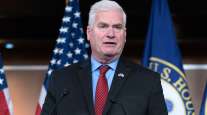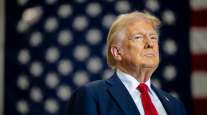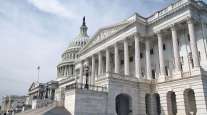Senior Reporter
Emergency Relief Legislation Shifts Focus From Funding Bills

[Ensure you have all the info you need in these unprecedented times. Subscribe now.]
Debates on COVID-19-related economic measures, which dominate the agenda on Capitol Hill, are overshadowing must-pass legislation that would keep the government funded through fiscal 2021.
Democrats in the House have outlined guidelines for the consideration of a $3 trillion pandemic relief package May 15. During the pandemic, Congress has advanced to President Donald Trump’s desk about $3 trillion worth of emergency aid.
Democrats, led by Speaker Nancy Pelosi (D-Calif.), have yet to announce a schedule for considering the funding measures for the federal agencies. One of the bills focuses on operations at the U.S. Department of Transportation.
In the Senate, a path forward on the funding bills also has not been announced. Senior senators have pointed to the potential for considering several appropriations bills as early as June. In total, Congress is tasked with considering 12 appropriations bills before the end of September.
Failing to enact the funding measures before the end of the fiscal year or approve a continuing funding resolution results in a shutdown of aspects of the federal apparatus.
The coronavirus upended Congress’ legislative business, requiring the temporary adoption of safety guidelines. For instance, lawmakers wear masks and sit apart from each other at a requisite distance during hearings.
The top Republican in the House, California Rep. Kevin McCarthy, had called on Democrats in control of the chamber to proceed with a phased return to legislating by relying on communication tools and enhanced social distancing guidelines, as well as prioritizing bipartisan measures at committees.
Doing so, McCarthy explained, would assist with the advancement of the fiscal appropriations bills, as well as high-profile policy legislation such as a national defense reauthorizing bill.
“We fully appreciate the extraordinary nature of the challenge before us,” McCarthy indicated earlier this month, with fellow Republican Reps. Tom Cole of Oklahoma and Rodney Davis of Illinois. “Every avenue should first be explored that preserves enduring institutional rules while prioritizing member health.”

McCarthy
“I think [we have the] capability of making this happen, so when these bills come out of committee, you’d be [told] this is the day we’re going to vote,” McCarthy said in a separate interview. “It is essential that we work.”
For DOT in fiscal 2021, the Trump White House has requested $21.6 billion in discretionary spending, a 13% decrease from the level enacted the previous year. Mandatory contract authority and obligation limitations would receive $66.2 billion, an 8% increase from the previous-year enacted level. The Federal Motor Carrier Safety Administration, a trucking regulator, would receive nearly a 4% increase from the previous year under the request.
The request also proposes for infrastructure and freight grants to each receive $1 billion, a figure Transportation Secretary Elaine Chao touted on Capitol Hill in March.
“These programs provide federal assistance for critical projects that will spur progress in both rural and urban communities across all modes of surface transportation infrastructure: highways, transit, rail and ports,” she said.
Republicans on the transportation funding committees were mostly receptive to the White House’s request, while Democrats on the same panels criticized proposed funding levels for transit and Amtrak.
Want more news? Listen to today's daily briefing:




